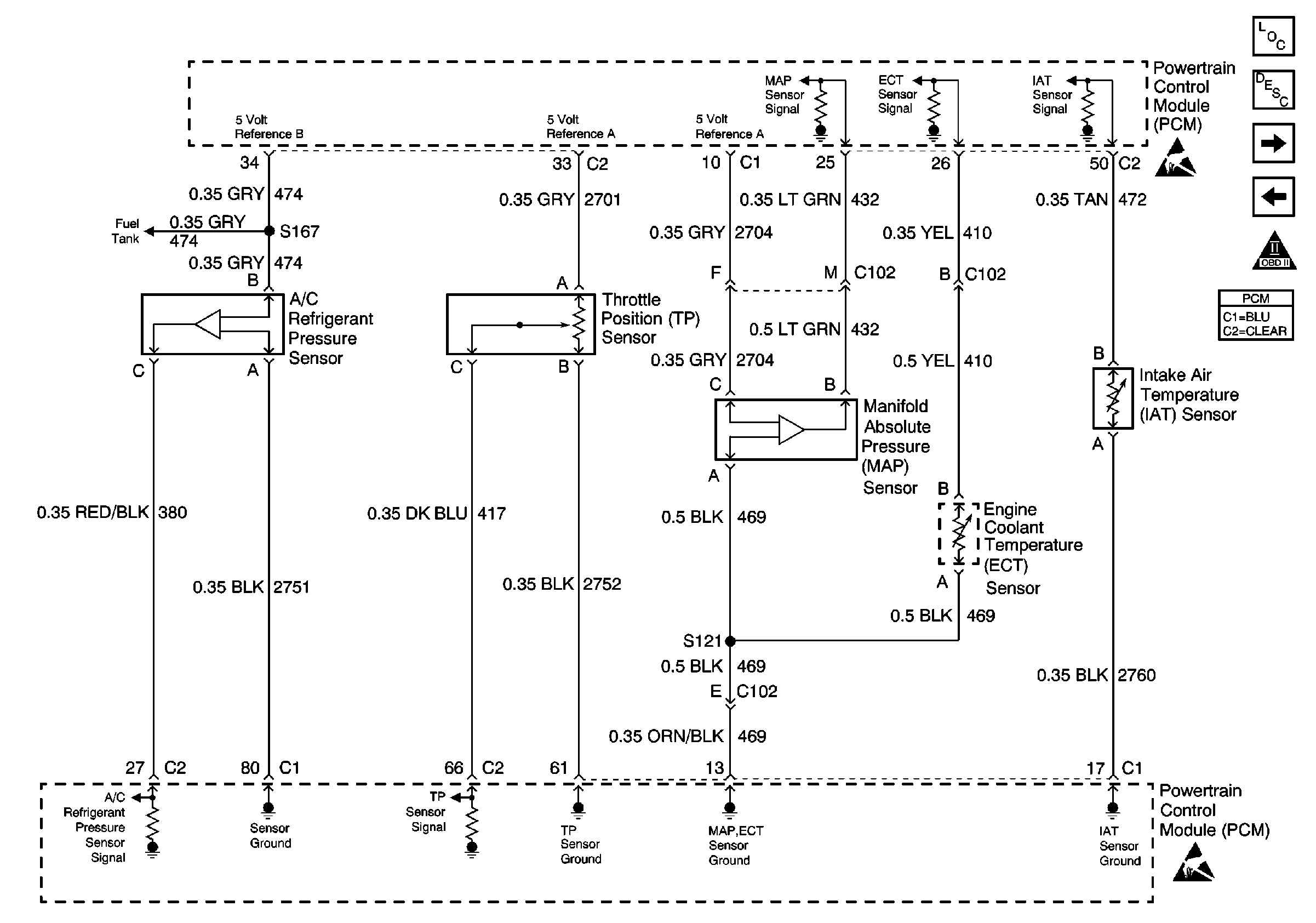Refer to
A/C, Throttle Position, Manifold Absolute Pressure, Engine Coolant
Temperature and Intake Air Temperature Sensors

.
Circuit Description
The intake air temperature (IAT) sensor is a thermistor which measures the temperature of the air entering the engine. The PCM applies 5.0 V through a pull up resistor. When the intake air is cold, the sensor resistance is high and the PCM will monitor a high signal voltage on the IAT sensor signal circuit. As the intake air warm, the sensor resistance becomes lower causing the PCM to monitor a lower voltage. If the PCM detects an excessively high IAT sensor signal voltage (low temperature indicated), DTC P0113 will set.
Conditions for Running The DTC
| • | Active ECT, MAF sensor or VSS DTC are not present. |
| • | Vehicle speed is less than 56 km/h (35 mph). |
| • | MAF is less than 12 gm/s. |
| • | ECT is more than 60°C (140°F). |
| • | The Engine run time is more than 3 minutes. |
Conditions for Setting the DTC
| • | IAT signal voltage indicates an intake air temperature less than -37°C (-35°F). |
| • | The above conditions are present for at least 20 seconds. |
Action Taken When the DTC Sets
| • | The PCM will illuminate the malfunction indicator lamp (MIL) during the second consecutive trip in which the diagnostic test has been run and failed. |
| • | The PCM will store conditions which were present when the DTC set as Freeze Frame/Failure Records data. |
Conditions for Clearing the MIL/DTC
| • | The PCM will turn OFF the malfunction indicator lamp (MIL) during the third consecutive trip in which the diagnostic has run and passed. |
| • | The history DTC will clear after 40 consecutive warm-up cycles have occurred without a malfunction. |
| • | The DTC can be cleared by using a scan tool. |
Diagnostic Aids
Inspect for the following conditions:
| • | Poor connection at the PCM may be caused by the following conditions: |
| - | Backed out terminals |
| - | Improper mating |
| - | Broken locks |
| - | Improperly formed or damaged terminals |
| - | Poor terminal to wire connection |
| • | Damaged harness |
| • | Intermittents--If the harness appears to be OK, observe the IAT display on the scan tool while moving connectors and wiring harnesses related to the sensor. A change in the display will indicate the location of the malfunction. Refer to Testing for Intermittent Conditions and Poor Connections or to Wiring Repairs in Wiring Systems. |
If DTC P0113 cannot be duplicated, the information included in the Fail Records data can be useful in determining vehicle mileage since the DTC was last set.
Test Description
The numbers below refer to the step numbers on the diagnostic table:
-
Verifies that the fault is present.
-
If DTC P0113 can be repeated only by duplicating the Fail Records conditions. The Temperature vs Resistance table may be used to test the IAT sensor at various temperatures to evaluate the possibility of a shifted sensor that may be open above or below a certain temperature. If this is the case, replace the IAT sensor. Refer to IAT sensor Replacement. If the IAT sensor appears to be OK, the fault is intermittent. Refer to Diagnostic Aids.
-
Use a fused jumper during this test. If the IAT signal circuit is shorted to battery or ignition positive voltage the fuse in the jumper will open, indicating a short in the signal circuit.
-
This vehicle is equipped with a PCM which utilizes an electrically erasable programmable read only memory (EEPROM). When the PCM is being replaced, the new PCM must be programmed.
Step | Action | Values | Yes | No |
|---|---|---|---|---|
1 | Did you perform the Powertrain On Board Diagnostic (OBD) System Check? | -- | ||
Does the scan tool indicate the IAT parameter is less than the specified value? | -37°C (-35°F) | |||
Does scan tool indicate DTC P0113 failed this ignition? | -- | Go to Diagnostic Aids | ||
4 |
Does the scan tool indicate the IAT parameter is more than the specified value? | 135°C (275°F) | ||
Does the scan tool indicate the IAT parameter is more than the specified value? | 135°C (275°F) | |||
6 | Test the signal circuit of the IAT sensor for a short to voltage. Refer to Wiring Repairs in Wiring Systems. Did you find and correct the condition? | -- | ||
7 | Test the ground circuit of the IAT sensor for a high resistance or an open. Refer to Wiring Repairs in Wiring Systems. Did you find and correct the condition? | -- | ||
8 | Test the signal circuit of the IAT sensor for an open. Refer to Wiring Repairs in Wiring Systems. Did you find and correct the condition? | -- | ||
9 | Inspect for faulty IAT sensor ground or signal circuit connections at the PCM. Refer to Testing for Intermittent Conditions and Poor Connections and Connector Repairs in Wiring Systems. Did you find and correct the condition? | -- | ||
10 | Inspect for a faulty connections at the IAT sensor. Refer to Testing for Intermittent Conditions and Poor Connections and Connector Repairs in Wiring Systems. Did you find and correct the condition? | -- | ||
11 | Replace the IAT sensor. Refer to Intake Air Temperature Sensor Replacement . Did you complete the replacement? | -- | -- | |
|
Important: The replacement PCM must be programmed. Replace the PCM. Refer to Powertrain Control Module Replacement/Programming . Did you complete the replacement? | -- | -- | ||
13 |
Does the DTC reset? | -- | System OK |
